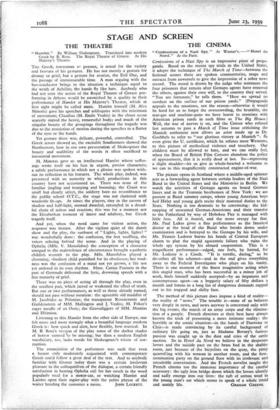STAGE AND SCREEN
THE THEATRE
" Hamlet." By William Shakespeare. Translated into modern Greek by B. Rota. The Royal Theatre of Greece. At His Majesty's Theatre.
THE Greek, townsman o' peasant, is noted for the variety and bravura of his gestures. He has not merely a gesture for dismay or grief, but a gesture for avarice, the Evil One, and the passage of immeasurable time. A man arguing with the bus-conductor brings to the situation a technique equal to the wrath of Achilles; the hands fly like bats. Anybody who had not seen the actors of the Royal Theatre of Greece per- forming in Athens would be astonished by a quality in their performance of Hamlet at His Majesty's Theatre, which at first sight might be called static. Hamlet himself (M. Alex Minotis) gave his speeches and soliloquies with the minimum of movement; Claudius (M. Emile Veakis) in the closet scene scarcely stirred the heavy, remorseful body; and much of the singular beauty of the groupings throughout the tragedy was due to the restriction of motion during the speeches to a flutter of the eyes or the hands.
Yet gesture there was, delicate, powerful, controlled. The Greek actors showed us, the excitable Southerners showed the Northerners, how in our own presentation of Shakespeare the beauty and audibility of the words is often sacrificed to inessential movement.
M. Minotas gave us an intellectual Hamlet whose suffer- ings wrote itself on his face in urgent, precise characters; a subtle performance in which not a phrase was spoken with- out its reflection in his features. The whole play, indeed, was presented with an austerity to which productions in this country have not accustomed us. There was none of the familiar jingling and tramping and booming; the Court was small but clearly select, the soldiery bore no resemblance to the public school O.T.C., the stage was not cluttered with wardrobe fit-ups. At times the players, tiny in the cavern of shadow and half-light, seemed dwarfed, entangled in a dread- ful chain of action and reaction; this was for a moment not the Elizabethan torment of incest and adultery, but Greek tragedy itself.
And yet, when the need came for violent action, the response was instant. After the vigilant quiet of the dumb show and the play, the outburst of " Lights, lights, lights! " was wonderfully done : the confusion, the feet scuffling, the voices echoing behind the scene. And in the playing of Ophelia (Mlle. V. Manolidou) the conception of a character unequal to the malevolence of circumstance brought a pathetic childish warmth to the play. Mlle. Manolidou played a charming, obedient child punished for its obedience; her mad- ness was the confusion of a mind not yet grown, a life not yet ordered in its own rhythm. Mme. Catina Paxinou in the part of Gertrude delivered the lyric, drowning speech with a fine maturity of grief.
There was no piece of acting all through the play, even in the smallest part, which jarred or weakened the effect of truth. But one or two performances, as well as those already named, should not pass without mention: the agreeable old meddler of M. Jacobides as Polonius; the transparent Rosencrantz and Guildenstern of MM. Malliagros and J. Veakis; M. Fokas's eager noodle of an Osric; the Gravediggers of MM. Mamias and Eftimiou.
Listening to this Hamlet from the other side of Europe, one felt more and more strongly what a beautiful language modern Greek is: how quick and alert, how flexible, how musical. In M. B. Rota's version of the play some of the darker shades of horror seemed to be missing; but then a modern English vocabulary, too, lacks words for Shakespeare's vision of cor- ruption.
The enunciation of the performers was such that even a hearer only moderately acquainted with contemporary Greek could follow a great deal of the text. And to anybody familiar with Greece today there was a certain irrelevant pleasure in the colloquialism of the dialogue, a certain friendly satisfaction in hearing Ophelia call for her coach in the word popularly used for a motor-car, or watching Hamlet and Laertes open their rapier-play with the polite phrase of the
waiter handing the customer a menu. JoHN LoczErr.










































 Previous page
Previous page